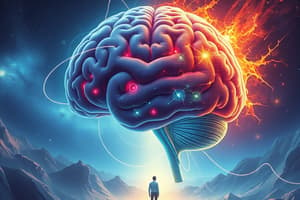Podcast
Questions and Answers
What is the term used to describe the perceptual tendency to assume that the members of other groups are more similar to each other?
What is the term used to describe the perceptual tendency to assume that the members of other groups are more similar to each other?
- Outgroup homogeneity bias (correct)
- Stereotypes bias
- Group attribution error
- Ultimate attribution error
What is the Self Fulfilling prophecy?
What is the Self Fulfilling prophecy?
- Believing other groups lack human qualities
- Viewing one's group as morally superior
- Expecting something from someone, leading them to fulfill that expectation (correct)
- Surveying respondents on perceived range of ability in faculty
Which bias involves attributing negative actions of outgroup members to dispositional qualities and positive actions to situational circumstances?
Which bias involves attributing negative actions of outgroup members to dispositional qualities and positive actions to situational circumstances?
- Group attribution error
- Ultimate attribution error (correct)
- Outgroup homogeneity bias
- Ingroup-outgroup bias
What is the kernel of truth hypothesis related to stereotypes?
What is the kernel of truth hypothesis related to stereotypes?
How do humans interpret actions differently according to the text?
How do humans interpret actions differently according to the text?
What did the study by Brown & Smith (1989) on female and male faculty show?
What did the study by Brown & Smith (1989) on female and male faculty show?
What concept involves classifying objects immediately upon seeing them and perceiving classified objects as more similar to each other than they really are?
What concept involves classifying objects immediately upon seeing them and perceiving classified objects as more similar to each other than they really are?
What is Moral Exclusion as described in the text?
What is Moral Exclusion as described in the text?
How did Rosenthal & Jacobson's (1968) study manipulate teachers' expectations?
How did Rosenthal & Jacobson's (1968) study manipulate teachers' expectations?
According to the Stereotype Content Model, what two dimensions influence people's beliefs about social groups?
According to the Stereotype Content Model, what two dimensions influence people's beliefs about social groups?
What type of thinking is described as interpreting actions differently depending on whether they are from the ingroup or the outgroup?
What type of thinking is described as interpreting actions differently depending on whether they are from the ingroup or the outgroup?
What is Dehumanization as described in the text?
What is Dehumanization as described in the text?
Flashcards are hidden until you start studying
Study Notes
Interpersonal Perception and Intergroup Conflict
- When we perceive a group as high in competence and high in warmth, we feel admiration.
- Self-fulfilling prophecy: our expectations of others can influence their behavior, leading them to fulfill those expectations.
Dehumanization and Exclusion
- Extreme intergroup conflict leads to group members viewing their group as morally superior and outgroup members as less than human.
- Two types of dehumanization:
- Moral exclusion: viewing opponents as undeserving of morally mandated rights and protections.
- Dehumanization: believing that others lack qualities that distinguish humans from animals, used to rationalize negative treatment.
The Kernel of Truth Hypothesis
- Stereotypes are a distorted reflection of the reality experienced by a group.
- Brown & Smith (1989) study:
- Surveyed respondents on perceived ability of female and male faculty.
- Results: supported outgroup homogeneity for male faculty and ingroup homogeneity for female faculty.
The Pygmalion Effect
- Rosenthal & Jacobson (1968) study:
- Kindergarten to grade 4 children were given a fake test, with teachers told that 20% would excel.
- Results: children expected to do well showed higher intelligence gain.
Ingroup-Outgroup Bias
- Humans are biased towards ingroup and against outgroup.
- Ingroup-outgroup bias leads to:
- Double-standard thinking: interpreting actions differently depending on the group.
- Outgroup homogeneity bias: perceiving outgroup members as more homogeneous than ingroup members.
- Group attribution error: assuming individual characteristics and preferences are similar to those of the group.
- Ultimate attribution error: attributing negative outgroup actions to dispositional qualities and positive actions to situational circumstances.
Stereotypes and Group Perception
- Stereotypes are socially shared cognitive generalizations about a particular group or social category.
- Ingroup-outgroup homogeneity: perceiving people within a group as more similar and people between groups as more different than they are.
- Assimilation and contrast effects: perceiving groups as more similar or different than they are.
- The Stereotype Content Model: people's stereotyped views reflect beliefs about warmth, competence, and unique characteristics, leading to particular emotional reactions.
Studying That Suits You
Use AI to generate personalized quizzes and flashcards to suit your learning preferences.




